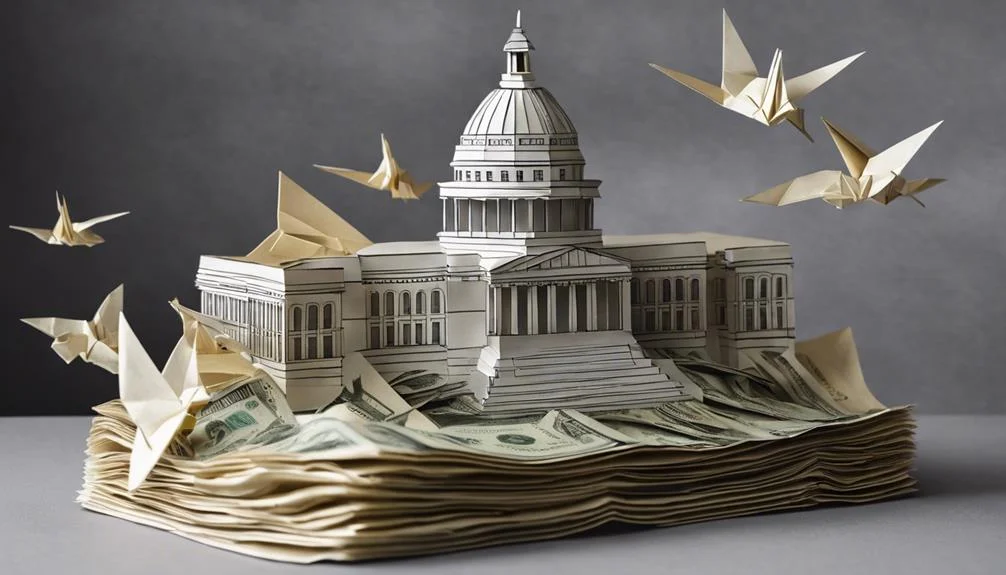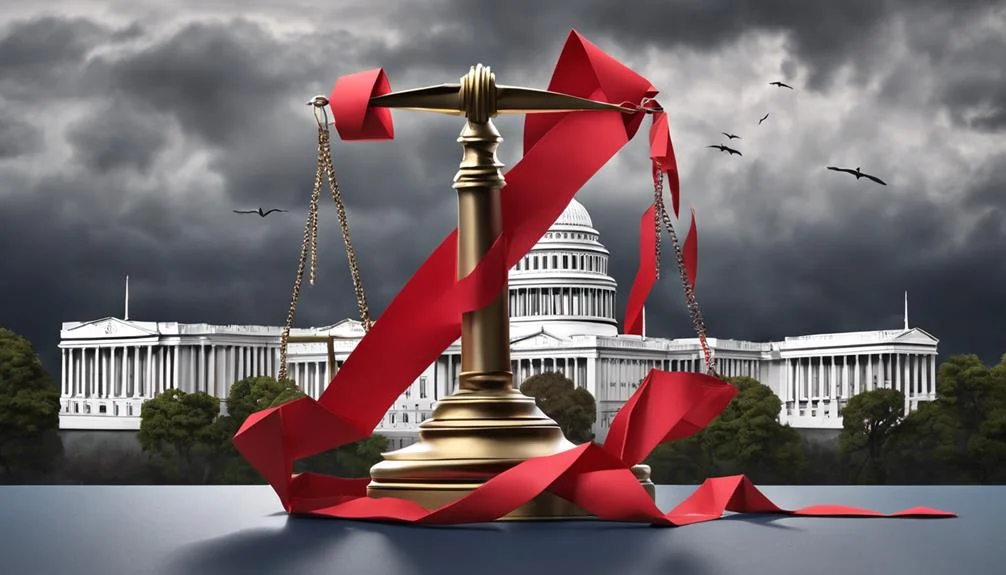The pros of campaign finance reform are reducing wealthy donors’ influence, increasing transparency, leveling the playing field, and enhancing trust.
Campaign finance reform ensures candidates aren’t reliant on wealthy individuals or groups, promotes equal opportunities, and fosters greater trust.
The cons of campaign finance reform are potential restrictions on free speech, infringing upon freedom of speech, and disadvantaging certain supporters.
These restrictions can limit contributions, making it challenging for many Americans to support their preferred candidates financially, affecting engagement.
Takeaways:
- Campaign finance reform aims to reduce corruption and enhance transparency in political funding.
- Stricter contribution limits and disclosure requirements can level the playing field for candidates.
- Concerns exist about potential restrictions on free speech and political expression due to overregulation.
- The balance between preventing undue influence and maintaining a vibrant political landscape is crucial.
| Pros of Campaign Finance Reform | Cons of Campaign Finance Reform |
|---|---|
| Limits Wealthy Donor Influence | Restricts Free Speech |
| Increases Political Transparency | Complex Regulation |
| Levels the Playing Field | Potential for Evasion |
| Enhances Trust in Politics | Disadvantages Newcomers |
| Prevents Corruption | Reduces Political Engagement |
| Encourages Small Donor Participation | Favors Wealthy Candidates |
| Reduces Campaign Spending | Challenges in Enforcement |
| Promotes Policy over Patronage | May Limit Diversity of Opinion |
| Supports New Candidates | Potential Impact on Voter Turnout |
| Strengthens Democracy | Unintended Consequences |
Pros of Campaign Finance Reform
- Limits Wealthy Donor Influence: Campaign finance reform reduces the control wealthy individuals and special interest groups have over political candidates by capping the amount they can donate. This ensures a more democratic process where the voices of the few do not drown out the many. As a result, candidates may feel less pressure to cater exclusively to the interests of their largest donors, promoting a more equitable representation of the electorate’s needs and concerns.
- Increases Political Transparency: By requiring detailed disclosure of campaign funding sources, campaign finance reform makes political funding more transparent. Voters can see where candidates get their money, which helps in identifying potential conflicts of interest or undue influence. This level of transparency is crucial for maintaining the integrity of the electoral process and for holding candidates accountable for their financial associations.
- Levels the Playing Field: Campaign finance reform aims to equalize opportunities for all candidates, including those from less affluent backgrounds or those without extensive networks of wealthy donors. By providing public funding options or setting spending limits, the reform ensures that all candidates have a fair chance to communicate their messages to voters. This diversity enriches the political landscape and encourages participation from a broader range of perspectives.
- Enhances Trust in Politics: The implementation and enforcement of campaign finance rules can significantly boost public trust and confidence in the political process. When voters believe that elections are conducted fairly and that politicians are not unduly influenced by big money, their faith in democratic institutions is strengthened. This trust is essential for the effective functioning of a democratic society.
- Prevents Corruption: By limiting the amount of money that can flow into political campaigns, finance reform acts as a barrier against corruption. It reduces the risk of politicians being bribed or influenced by large donations, ensuring that decisions are made in the public interest rather than to benefit a select few donors. This protection against corruption is fundamental to preserving the integrity of political decisions.
- Encourages Small Donor Participation: Reform measures, such as matching funds for small donations, incentivize participation from a wider segment of the population. This democratizes political funding by making every small contribution more impactful, encouraging more people to engage in the political process. It shifts the focus from courting a few wealthy donors to building a broad base of support.
- Reduces Campaign Spending: Campaign finance reform can lead to a reduction in overall campaign spending, making it less necessary for candidates to spend a significant portion of their time fundraising. This allows politicians to focus more on engaging with constituents and addressing their concerns, rather than constantly seeking financial support.
- Promotes Policy over Patronage: With reduced pressure to cater to big donors, politicians can prioritize policy decisions based on their merits and the needs of their constituents. This shift away from patronage politics means that legislative agendas can be set based on what is best for the majority, rather than what benefits a privileged few.
- Supports New Candidates: The reforms can help new and independent candidates by lowering the financial barriers to entry into politics. This diversification can lead to more innovative ideas and policies, challenging the status quo and bringing fresh perspectives to political discourse.
- Strengthens Democracy: Overall, campaign finance reform strengthens the democratic process by ensuring that elections are fair and competitive. It helps to ensure that elected officials are responsive to their constituents, not just their biggest donors, which is essential for a healthy democracy.
Cons of Campaign Finance Reform
- Restricts Free Speech: Critics argue that campaign finance reform can infringe upon free speech by limiting how much individuals can contribute to political campaigns. They contend that donating money is a form of political expression, and restrictions on campaign contributions could unduly silence voices in the political arena. This limitation could disproportionately affect grassroots movements that rely on small, numerous donations to amplify their message.
- Complex Regulation: The implementation of campaign finance laws introduces a complex set of regulations that candidates and donors must navigate. This complexity can inadvertently favor those with the resources to understand and exploit these rules, potentially disadvantaging smaller, less wealthy campaigns. The bureaucratic burden of compliance can also deter individuals from participating in the political process.
- Potential for Evasion: Despite regulations, there are always ways for determined individuals or groups to circumvent campaign finance laws, such as through the use of Super PACs or dark money groups. These loopholes can undermine the effectiveness of reform efforts, allowing undisclosed and unregulated money to continue influencing politics.
- Disadvantages Newcomers: While intended to level the playing field, campaign finance reform can sometimes have the opposite effect by solidifying the advantages of incumbents. Experienced politicians may have existing networks and fundraising mechanisms that are not as reliant on large contributions, making it harder for newcomers to compete.
- Reduces Political Engagement: By limiting the amount individuals can contribute, campaign finance reform might discourage some from participating in the political process. If people feel that their contributions are too restricted to make a difference, they might choose not to donate at all, reducing overall political engagement.
- Favors Wealthy Candidates: Campaign finance reform can inadvertently favor wealthy candidates who can self-finance their campaigns. These individuals are not limited by fundraising caps and can spend vast amounts of their own money, giving them a significant advantage over those who rely on external contributions.
- Challenges in Enforcement: Enforcing campaign finance laws can be challenging and resource-intensive. Monitoring and investigating violations require substantial effort and can strain the capacities of regulatory bodies. This difficulty in enforcement can lead to inconsistencies and the perception that some violations go unpunished.
- May Limit Diversity of Opinion: By imposing uniform restrictions on campaign contributions, reform efforts might unintentionally limit the diversity of political opinions that can gain traction. Financial constraints could make it more difficult for niche or minority viewpoints to find the support needed to be heard on a larger stage.
- Potential Impact on Voter Turnout: If campaign finance reform leads to less advertising and reduced campaign visibility, it could have a negative impact on voter turnout. Less exposure to campaigns might result in lower public interest and engagement, potentially diminishing electoral participation.
- Unintended Consequences: Well-intentioned campaign finance laws can sometimes have unforeseen negative effects, such as stifling political innovation or making campaigns more negative. In efforts to work within the confines of the law, campaigns might adopt strategies that are not in the best interest of a constructive political discourse.
Understanding Campaign Finance
Campaign finance, a critical component of the electoral process, encompasses the regulation of funding, donation limits, and the disclosure of expenditures to ensure fairness and transparency in elections. The framework within which campaign finance operates is designed to prevent corruption and influence peddling by setting clear rules for financial contributions to political parties and candidates. These regulations vary significantly across different levels of the electoral system, with distinct guidelines for local, state, and federal elections.
The Federal Election Commission (FEC) plays a pivotal role in enforcing these laws, supervising fundraising activities, and ensuring that campaign finance regulations are adhered to. By monitoring and regulating the flow of money in politics, the FEC seeks to maintain the integrity of the electoral process and prevent undue influence by wealthy individuals and entities.
Transparency is a cornerstone of campaign finance, with laws requiring the public disclosure of donations and expenditures. This openness serves to deter potential corruption by making financial transactions visible to voters, thus promoting accountability among political actors. Overall, the objective of campaign finance laws is to limit the size of contributions to political campaigns and enhance the transparency of political financing, ensuring a level playing field for all candidates and parties.
The Case for Reform

Given the complexities and challenges outlined in understanding campaign finance, it becomes imperative to explore the necessity of reform in this sector. The current landscape of campaign financing, with its minimal restrictions on contributions, has led to a scenario where politics can often seem more about the depth of one’s pockets than the depth of one’s ideas. Reform in this area is not just desirable but essential for several reasons:
- Limiting Contributions: By imposing stricter limits on both monetary and non-monetary contributions from individuals and entities, campaign finance reform aims to prevent any single group or individual from having undue influence over political decisions. This ensures a more level playing field for all candidates, irrespective of their financial backing.
- Focusing on Issues: Reform measures can help candidates concentrate on discussing important issues rather than dedicating a significant portion of their time to fundraising. This shift in focus can lead to more informed and substantive policy debates, benefiting the electorate.
- Enhancing Transparency: Implementing reforms that require detailed disclosure of contributions promotes transparency. This allows voters to better understand where candidates are receiving their support from, thus illuminating potential biases or conflicts of interest.
Potential for Reduced Corruption

Addressing corruption within political systems, campaign finance reform offers a promising avenue by setting stringent controls on financial contributions to candidates and parties. This approach is grounded in the belief that limiting the influence of wealthy donors and special interest groups can significantly curb the sway they hold over politicians. By implementing stricter regulations on campaign contributions, reform initiatives aim to dismantle the quid pro quo dynamic where financial support is traded for political favors. Such measures not only prevent potential corruption but also ensure that political decisions are made in the public interest rather than being influenced by a select few.
Moreover, the introduction of transparency measures in campaign finance is pivotal in exposing any unethical or corrupt practices, thereby fostering a culture of accountability among elected officials. This increased visibility into the financial workings of political campaigns is instrumental in promoting fairness and equality, further reducing the opportunities for corrupt dealings. Ultimately, the diminished influence of money in politics through campaign finance reform is expected to fortify public trust in the political system, ensuring that the needs and interests of the general populace take precedence over those of special interest groups.
Enhanced Political Equality

Campaign finance reform is fundamentally about fostering enhanced political equality by addressing the disproportionate influence wealthy individuals and special interest groups wield in elections.
By implementing caps on individual and corporate contributions, the reform seeks to create a more equitable environment for all candidates, thereby ensuring a fairer competition.
This shift towards equalizing the political landscape is pivotal in ensuring that every voter’s voice has the potential to be heard with equal weight, reducing the sway of financial power in the democratic process.
Leveling the Field
Efforts to reform campaign finance seek to mitigate the disproportionate influence of wealthy donors and special interest groups, thereby promoting a more equitable political arena. Campaign finance reform initiatives aim to create a level playing field where every candidate, regardless of financial backing, has a fair shot at election success. This goal is pursued through:
- Capping donations: Imposing limits on how much individuals and organizations can contribute to campaigns, ensuring that no single entity can unduly sway the electoral process.
- Increasing transparency: Mandating the disclosure of all campaign contributions and expenditures, allowing voters to see who is funding political campaigns.
- Restricting corporate donations: Limiting the financial influence of corporations in elections to prevent them from having a disproportionate impact on the political landscape.
These measures collectively strive for a democratic process where every voice has equal weight.
Reducing Wealth Influence
Building on the foundation of creating an equitable political environment, reducing the influence of wealth in elections is pivotal for enhancing political equality. Campaign finance reform plays a crucial role in curbing the sway of affluent individuals and special interest groups, thereby promoting a more balanced democratic process.
By imposing limits on large donations, it ensures that political representation is more reflective of the general populace rather than the privileged few. This approach not only levels the electoral playing field but also shifts the focus of candidates towards addressing broader issues rather than securing funds from a limited circle.
Furthermore, increased transparency in financial contributions and expenditures through reform measures encourages wider citizen participation, aiming to construct a fairer political landscape by diminishing the disproportionate impact of money in politics.
Concerns Over Free Speech

Addressing the delicate balance between safeguarding free speech and implementing campaign finance reform presents a significant challenge. The essence of democracy lies in ensuring that all voices, regardless of their financial backing, are heard. However, the introduction of stringent campaign finance laws may inadvertently tread on the fundamental right to free speech. This concern stems from several critical points:
- Potential Limitations on Free Speech: Campaign finance reform might restrict individuals’ ability to support their preferred candidates or causes, thereby infringing upon their rights. This is a fundamental concern, as contributions are often viewed as a form of political expression.
- Impact on Political Expression and Advocacy: Critics argue that reform efforts could dilute the vibrancy of political debate by limiting the resources available for advocacy and campaigning. This reduction in resources could, in turn, diminish the diversity of voices in the political arena.
- Finding the Right Balance: The central debate revolves around how to effectively regulate campaign contributions without compromising free speech rights. Achieving transparency in donations while protecting individuals’ rights to express their political preferences requires careful consideration and nuanced policy-making.
Risks of Overregulation

While concerns over free speech are paramount, it is equally important to consider the risks associated with overregulation in campaign finance reform. Overregulation can severely limit the avenues through which individuals and organizations can express their political preferences, effectively stifling free speech. By imposing excessive restrictions on political contributions, the system risks not only infringing on personal freedoms but also complicating the political engagement process to a degree that might deter participation.
Striking a delicate balance between ensuring transparency and respecting privacy is crucial. Overstepping in regulation can lead to unintended consequences such as driving political spending into less transparent, underground channels, or fostering the creation of loopholes that disproportionately benefit well-resourced groups. Such outcomes undermine the very objectives of campaign finance reform.
Moreover, overregulation could significantly impede grassroots movements, which often rely on small contributions from a broad base of supporters. Limiting the capacity of these movements to raise funds restricts the diversity of voices in the political arena, potentially skewing representation and influence towards those with established financial power. Finding the right level of regulation is essential to maintain a vibrant, participatory political landscape without imposing undue burdens that discourage engagement.
Transparency and Accountability

Shedding light on the financial mechanisms behind political campaigns, transparency, and accountability stand as pillars of integrity in the democratic process. These elements are critical in ensuring that the electorate is fully informed about who is backing political candidates and how campaign funds are being utilized. At the heart of campaign finance reform, these concepts aim to bolster the democratic ideals of fairness and equality in the electoral process.
Here are three key aspects where transparency and accountability manifest in campaign finance reform:
- Public Disclosure of Donors and Expenditures: Transparency ensures that all financial contributions and campaign expenditures are made public. This allows voters to see who is funding political campaigns, potentially revealing any biases or influences that could sway policy decisions.
- Prevention of Corruption and Undue Influence: Accountability measures, including strict reporting requirements, help to prevent corruption by holding candidates and political parties responsible for their financial activities. This oversight ensures that all campaign finance activities are conducted within legal and ethical boundaries.
- Enhancement of Public Trust: Transparent and accountable campaign finance practices foster greater trust in the political process. When voters have clear insight into campaign funding sources and spending, it reassures them that elections are conducted fairly, enhancing confidence in democratic institutions.
Conclusion
In conclusion, the debate surrounding campaign finance reform is multifaceted, involving a balance between reducing corruption and enhancing political equality. It also considers the implications for free speech and the risks associated with overregulation. Effective reform necessitates a nuanced approach that addresses the potential for undue influence and ensures transparency and accountability, without stifling political expression.
Striking this balance is essential for fostering a democratic process that is both fair and representative of the electorate’s diverse views and interests.